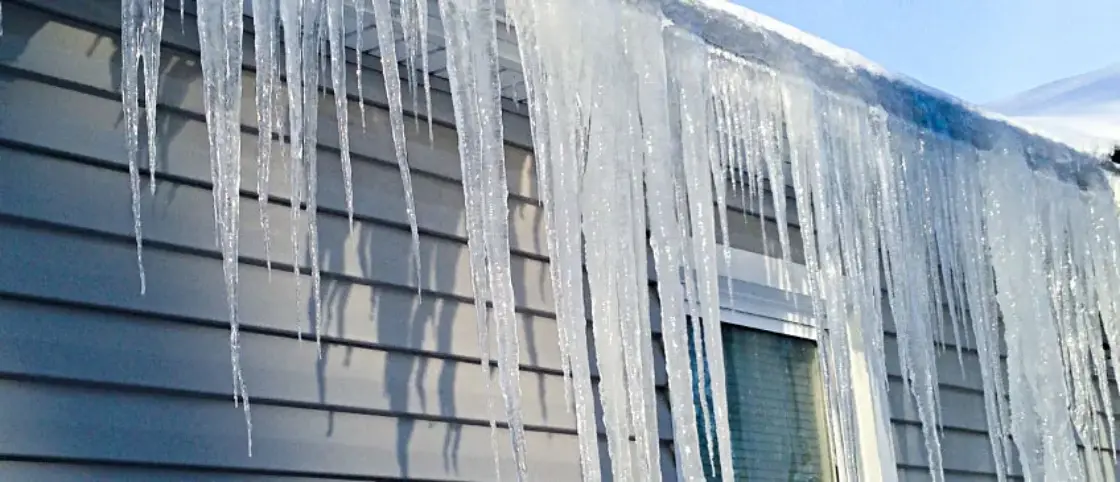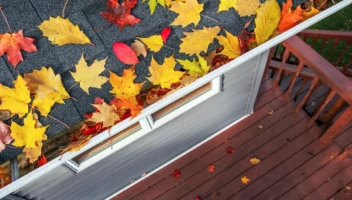Why Do Ice Dams Occur?

Ice dams are not only annoying and damaging to your home, they can be dangerous, too!
An ice dam is a ridge of ice that forms at the edge of a roof and prevents melting snow from draining off the roof. Ice dams can cause issues when the water seeps into your home and causes damage to your walls, ceilings, insulation, and other areas of the home that are meant to be kept dry.
In this article, we explore what actually causes ice dams as well as the topic of ice dam prevention.
What Causes Ice Dams?
Have you ever looked up at your roof and seen some areas stay rather dry while other areas are covered in snow?
For an ice dam to occur, there must be snow on the roof. For an ice dam to form, higher portions of the roof are above 32 degrees Fahrenheit, while lower surfaces are below 32 degrees Fahrenheit.
Indoor heating rises through the ceiling into the attic and warms the surface. As the snow begins to melt at the higher portions of the roof, it will begin to drop down towards the edge of your roof. As it hits the colder portion of your roof, it will freeze. Voila! The ice dam is beginning to form.
As melting snow feeds the ice dam, icicles will continue to grow and expand. Water can also find its way into the cracks and openings in your roof and can even flow into the attic space. Areas, such as your basement and attic, which are meant to be kept dry, may become inundated with water. This can cause serious and costly destruction to your home.

What Types of Damage Will Ice Dams Cause?
Ice dams are a danger to the home and the people below. At any time, an ice dam can break off from the edge of your home and injure a person or child below. Furthermore, the dripping water can cause puddles on your walkways, which can eventually ice over, creating a fall hazard. Snow can avalanche off the roof, causing damage to your cars or property. In addition, ice dams can cause the following home damages:
- Soffit and fascia rot
- Gutters and downspout damage
- Sheetrock water stains
- Insulation damage
- Basement flooding
- Roof and shingle damage
- …And much more!
For these reasons, it’s very important to prevent ice dams before they occur.
How Do I Prevent Ice Dams?
Ice dams can be prevented by controlling the heat loss from the home. If you are experiencing ice dam issues, it’s most likely from a lack of insulation or issues controlling heat loss from your home.
For ice dams prevention, follow these quick tips:
- First, ensure that no warm, moist air flows into the attic space. This will cause the top portion of the snow to melt.
- Increasing the amount of insulation on the ceiling/roof in your attic can help.
- Installing a continuous soffit and ridge vent system.
- Be sure that the air and insulation barrier you create is continuous.
Remember, to prevent ice dams, your goal is to have the roof all be one temperature.
What Should I Do If I Already Have an Ice Dam?
If an ice dam has already formed, remove the snow from the roof. Snow on the roof is a necessary ingredient in the formation of ice dams. A roof rake and push broom can be used to remove excess snow from your roof line.
Will Gutter Guards Prevent Ice Dams?
Some gutter guards will exacerbate ice dam issues, especially reverse curve or gutter helmet products. Their large opening that runs the entire length of the gutter allows debris in addition to snow and ice to fill the inside of the gutter, which creates even more issues. With the weight of the snow and ice, your gutters can pull away from your home and even fall to the ground.
LeafFilter™ Gutter Protection does not prevent nor create ice dams. However, by keeping your gutters free of debris, water will be able to divert through the gutters and away from your home rather than freezing in the eavestrough. Plus, by keeping gutters free of debris all year round, homeowners with LeafFilter-protected gutters can rest assured that melting snow on the roof will not overflow around clogs.
LeafFilter™ sits on top of internal hidden hangers in the gutter system, which keeps snow and ice out of your gutters. The internal hidden hangers provide unparalleled strength to handle the weight of snow and ice. As the snow melts, it will melt into your gutter, through your downspout, and away from your home, mitigating any chances of water-related home damage.
Request a Free Estimate from LeafFilter
A micromesh gutter guard from LeafFilter Gutter Protection will protect your gutters, and your entire home, from winter weather-related damage. Your gutters are your home’s first line of defense from water-related damage, so it’s important to maintain clear and clog-free gutters, not just during the winter, but year-round, too.
With a lifetime warranty backed by a team you can trust, you can enjoy the peace of mind that your gutters are protected for life. Request a free estimate from LeafFilter Gutter Protection today.


